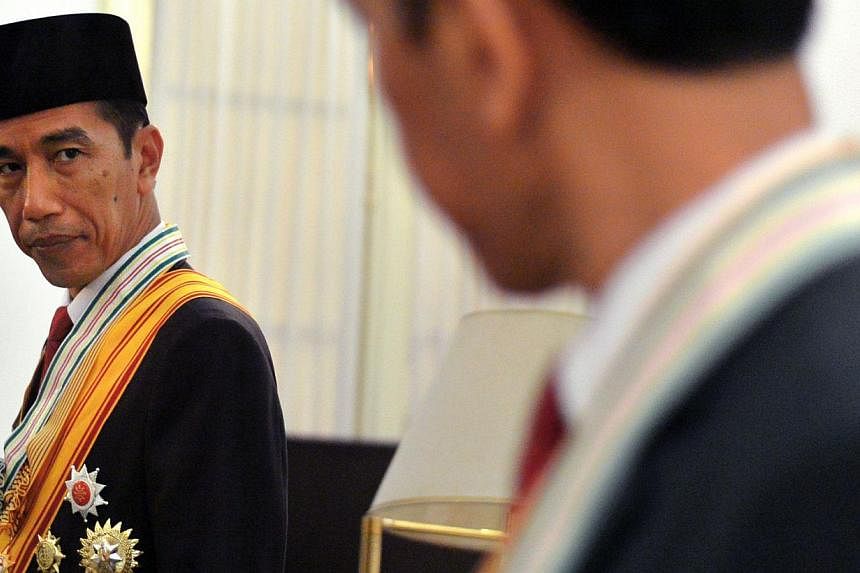President Joko Widodo's decision to scrap the long-stalled $21.1 billion Sunda Strait bridge may have been made easier by the fact that its former backer, influential businessman Tomy Winata, has now turned his attention elsewhere. He is eyeing an even bigger mega project - Jakarta's proposed $51 billion giant sea wall.
After personally assessing the bridge project, Indonesia's new President says he decided it was not in keeping with his overall development vision and that it would be better to upgrade the grossly-congested ferry service between Java and Sumatra.
That was always going to be more cost effective. In 2006, the government turned down a $632 million proposal by Ireland's Dublin Port Authority to introduce larger vehicular ferries, rebuild the terminals at both ends and streamline management and logistics systems.
Mr Joko and National Economic Planning Minister Andrinof Chaniago say the bridge would tend to concentrate development capital on the two most populated islands and widen the inequality gap with eastern Indonesia.
Mr Winata, a 56-year-old West Kalimantan-born businessman who has parlayed his connections with the military and police into a $700 million banking and property empire, is used to getting his own way. Not this time.
He seemed to have lost interest in the bridge last year - a year after finance minister Agus Martowardojo refused to sign a decree allowing him a central role in the venture. As one senior official put it: "We heard then he was eying the great sea wall instead."
Last July, Mr Winata confirmed an interest in tendering for the Dutch-designed National Capital Integrated Coastal Development project, which will enhance flood protection for the rapidly- sinking metropolis and foster urban development for two million of its people.
Funded by the city and central governments and foreign investors, it proposes a 32km-long sea wall, inside of which will be 17 artificial islands and a series of lagoons to take the outflow from the 13 rivers that drain the city.
The sea wall has clearly superseded the Sunda Strait bridge as one of the public-private partnership (PPP) centrepieces of former president Susilo Bambang Yudhoyono's surviving Master Plan for the Acceleration and Expansion of Indonesian Economic Development.
Mr Winata had been pushing hard for the 29km-long bridge since 2011, when a decree from Dr Yudhoyono gave a consortium of the tycoon's Artha Graha Group and the Banten and Lampung provincial governments control of a $190 million feasibility study.
The Graha Banten Lampung Sejahtera venture also stood to gain from customary entitlements in the construction of the bridge, including the right to match the lowest tender and a 10 per cent cost advantage over other bidders.
Artha Graha owned 95 per cent of the company's shares, with the rest held by the two cash- strapped administrations on the eastern and western edges of Sumatra and Java where Mr Winata reportedly bought up large tracts of land in preparation for the project. Then Finance Minister Martowardojo was particularly concerned about a repeat of the Jakarta monorail debacle in which private developers failed to overcome financial and legal problems and left the government holding $88 million in debt.
The bridge, designed to carry a double electric-rail track and six car lanes, was part of a wider $31.5 billion plan, known as the Strategic Infrastructure and Regional Development of the Sunda Strait, which was originally slated to be launched this year.
But even with an expected $76 truck tariff for a one-way trip, the bridge payback period would still be almost 50 years, three times longer than what private investors normally wait for cost recovery and a return on investment.
The government's PPP template would have required state guarantees for the project because of the financial risks involved. Even then, it would also have had to come up with viability-gap financing to make it more attractive to foreign investors.
Mr Martowardojo insisted it was for that reason the government had to be in full control of the two-year feasibility study. With the state committed to bearing the cost of the study if the project didn't go ahead, such a loss could be construed as corruption under Indonesian law.
When Mr Martowardojo was nudged into the job of Bank Indonesia governor in April last year, Dr Yudhoyono took more than a month to replace him with former investment board chairman Chatib Basri, who adopted exactly the same position as his predecessor.
A Sunda Strait bridge would have huge symbolic value, but Mr Joko clearly feels it will lead to an imbalance in national development and soak up funding needed for more urgently needed infrastructure.
With 2,700 trucks alone making the daily three-hour Sunda Strait crossing, the government would still have to upgrade the ports of Merak (Java) and Bakauheni (Sumatra) to cope with queues that some days stretch 10km or more. Consideration may also have to be given to building roll-on, roll-off port facilities in the more northerly Sumatran ports of Pekanbaru and Palembang to take the pressure off Merak and Bakauheni.
Even on Java, vehicular ferries may be introduced to transport trucks from the east and central areas to Jakarta's Tanjung Priok port because of the government's failure to provide rail access and to finish the long-delayed Trans-Java Highway.

